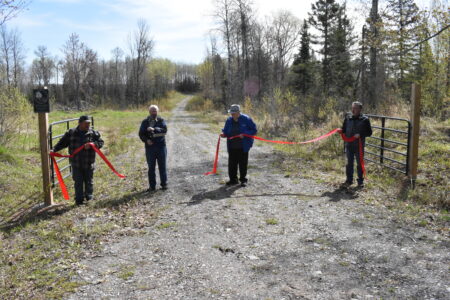Attorney General discusses address confidentiality program

Garrett Neese/Daily Mining Gazette Michigan Attorney General Dana Nessel talks during a presentation at the Copper Country Mental Health Institute Friday morning.
By GARRETT NEESE
gneese@mininggazette.com
HOUGHTON — Michigan Attorney Dana Nessel met with local advocates for survivors of domestic abuse and sexual assault at the Copper Country Mental Health Institute Friday morning.
Barbara Kettle Gundlach Shelter sponsored the event, at which Nessel discussed the state’s new Address Confidentiality Program and other state issues.
The program gives victims a substitute address to use on forms with the government, schools, or their job to prevent their abusers from finding them through public records.
It also provides a free forwarding system for any mail sent to the substitute address.
Approved by the governor through a 2020 act, the program will launch this September.
“I know this is more of a challenge up here where you have some small communities where everybody knows each other,” Nessel said. “But we want people to be able to get a driver’s license, and register to vote, and be able to get state assistance if they need it, and not have to worry that the state is going to give you up.”
If someone wants to participate, they need to be enrolled by someone who has undergone the training program. Nessel encouraged those in attendance to sign up for the training, which she said lasts about two hours.
Nessel also talked about legislation her office drafted regulating what information prosecutors need to turn over into the defense after new laws required more unredacted forms. The bill would exempt some information, such as driver’s license information or Social Security numbers of witnesses, from needing to be turned over. Defense attorneys would still be able to file a motion requesting it if they feel it is necessary for the case.
“We did it this way for decades and decades,” she said. “And even when I was working as a defense attorney, I never complained about it.”
The bill is named for Starkisha Thompson, a Detroit carjacking victim whose information was made available to the defendant through discovery. From jail, he relayed her address to the friend, who then tracked her down and murdered her.
“There’s no reason that the defendant in that case should have known where this woman lived,” she said.
Nessel testified before the legislature in support of bills to help protect human trafficking victims. One of the bills would make it easier for trafficking victims who committed crimes under duress to have their records expunged or not be charged in the first place in exchange for cooperation in prosecution of the traffickers.
Another bill in the package would lead to greater penalties for people convicted of soliciting. While those with first offenses would still go to diversionary programs, subsequent offenses would be punished by aggregate penalties similar to those for domestic abuse or retail fraud.
“To me, if we are stopping the people out there that are creating the demand for sexual trafficking, we’re just going to have less of it,” she said. “And I think we need to start taking it seriously.”
She called for more training across the board — not just law enforcement, but people in settings where trafficking might be taking place, such as motels or truck stop gas stations.
“And honestly, we have to start educating kids about this, and not just high school kids,” she said. “We should be starting as early as middle school to know what the signs are.”
The attorney general’s office is also continuing other large-scale investigations, such as those on sexual abuse within the Catholic Church. The state brought 11 cases, including one that resulted in a conviction in Ontonagon County. Eight have been convicted, while three are scheduled for trial.
A report has been released on the Marquette diocese; reports on the Gaylord and Kalamazoo dioceses are coming soon.
Michigan is also the only state in the country investigating Boy Scouts of America cases, she said. Through their civil suit, she said, she learned there were 5,000 victims in the state of Michigan.
A third major investigation involves murdered and missing indigenous people. A task force is addressing those issues and working to identify people. Part of the investigation includes collecting DNA samples from bodies that were found in the Wayne County morgue but never identified.
“We’re hoping we can at least help some of these families recover their loved ones,” Nessel said.




